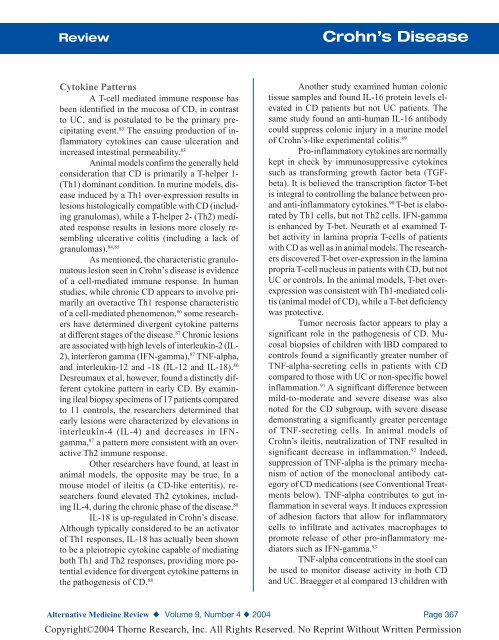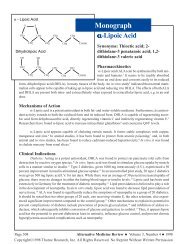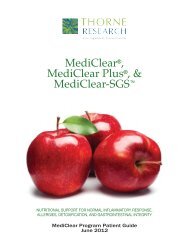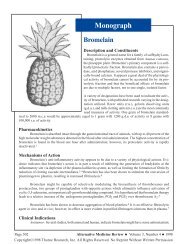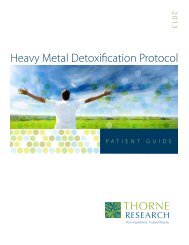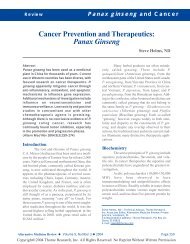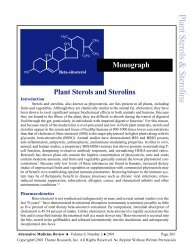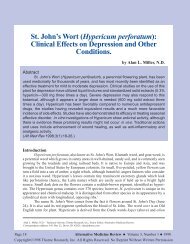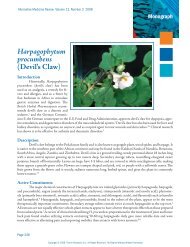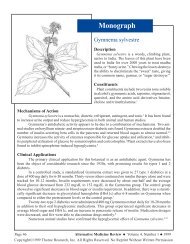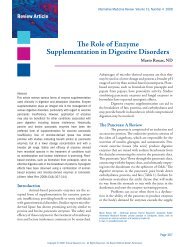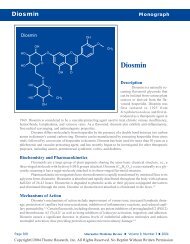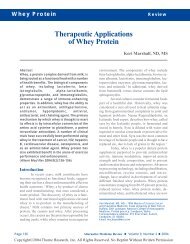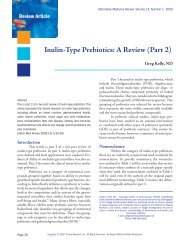Crohn's Disease - Thorne Research
Crohn's Disease - Thorne Research
Crohn's Disease - Thorne Research
Create successful ePaper yourself
Turn your PDF publications into a flip-book with our unique Google optimized e-Paper software.
ReviewCrohn’s <strong>Disease</strong>Cytokine PatternsA T-cell mediated immune response hasbeen identified in the mucosa of CD, in contrastto UC, and is postulated to be the primary precipitatingevent. 83 The ensuing production of inflammatorycytokines can cause ulceration andincreased intestinal permeability. 83Animal models confirm the generally heldconsideration that CD is primarily a T-helper 1-(Th1) dominant condition. In murine models, diseaseinduced by a Th1 over-expression results inlesions histologically compatible with CD (includinggranulomas), while a T-helper 2- (Th2) mediatedresponse results in lesions more closely resemblingulcerative colitis (including a lack ofgranulomas). 84,85As mentioned, the characteristic granulomatouslesion seen in Crohn’s disease is evidenceof a cell-mediated immune response. In humanstudies, while chronic CD appears to involve primarilyan overactive Th1 response characteristicof a cell-mediated phenomenon, 86 some researchershave determined divergent cytokine patternsat different stages of the disease. 87 Chronic lesionsare associated with high levels of interleukin-2 (IL-2), interferon gamma (IFN-gamma), 87 TNF-alpha,and interleukin-12 and -18 (IL-12 and IL-18). 86Desreumaux et al, however, found a distinctly differentcytokine pattern in early CD. By examiningileal biopsy specimens of 17 patients comparedto 11 controls, the researchers determined thatearly lesions were characterized by elevations ininterleukin-4 (IL-4) and decreases in IFNgamma,87 a pattern more consistent with an overactiveTh2 immune response.Other researchers have found, at least inanimal models, the opposite may be true. In amouse model of ileitis (a CD-like enteritis), researchersfound elevated Th2 cytokines, includingIL-4, during the chronic phase of the disease. 88IL-18 is up-regulated in Crohn’s disease.Although typically considered to be an activatorof Th1 responses, IL-18 has actually been shownto be a pleiotropic cytokine capable of mediatingboth Th1 and Th2 responses, providing more potentialevidence for divergent cytokine patterns inthe pathogenesis of CD. 88Another study examined human colonictissue samples and found IL-16 protein levels elevatedin CD patients but not UC patients. Thesame study found an anti-human IL-16 antibodycould suppress colonic injury in a murine modelof Crohn’s-like experimental colitis. 89Pro-inflammatory cytokines are normallykept in check by immunosuppressive cytokinessuch as transforming growth factor beta (TGFbeta).It is believed the transcription factor T-betis integral to controlling the balance between proandanti-inflammatory cytokines. 90 T-bet is elaboratedby Th1 cells, but not Th2 cells. IFN-gammais enhanced by T-bet. Neurath et al examined T-bet activity in lamina propria T-cells of patientswith CD as well as in animal models. The researchersdiscovered T-bet over-expression in the laminapropria T-cell nucleus in patients with CD, but notUC or controls. In the animal models, T-bet overexpressionwas consistent with Th1-mediated colitis(animal model of CD), while a T-bet deficiencywas protective.Tumor necrosis factor appears to play asignificant role in the pathogenesis of CD. Mucosalbiopsies of children with IBD compared tocontrols found a significantly greater number ofTNF-alpha-secreting cells in patients with CDcompared to those with UC or non-specific bowelinflammation. 91 A significant difference betweenmild-to-moderate and severe disease was alsonoted for the CD subgroup, with severe diseasedemonstrating a significantly greater percentageof TNF-secreting cells. In animal models ofCrohn’s ileitis, neutralization of TNF resulted insignificant decrease in inflammation. 92 Indeed,suppression of TNF-alpha is the primary mechanismof action of the monoclonal antibody categoryof CD medications (see Conventional Treatmentsbelow). TNF-alpha contributes to gut inflammationin several ways. It induces expressionof adhesion factors that allow for inflammatorycells to infiltrate and activates macrophages topromote release of other pro-inflammatory mediatorssuch as IFN-gamma. 93TNF-alpha concentrations in the stool canbe used to monitor disease activity in both CDand UC. Braegger et al compared 13 children withAlternative Medicine Review ◆ Volume 9, Number 4 ◆ 2004 Page 367Copyright©2004 <strong>Thorne</strong> <strong>Research</strong>, Inc. All Rights Reserved. No Reprint Without Written Permission


